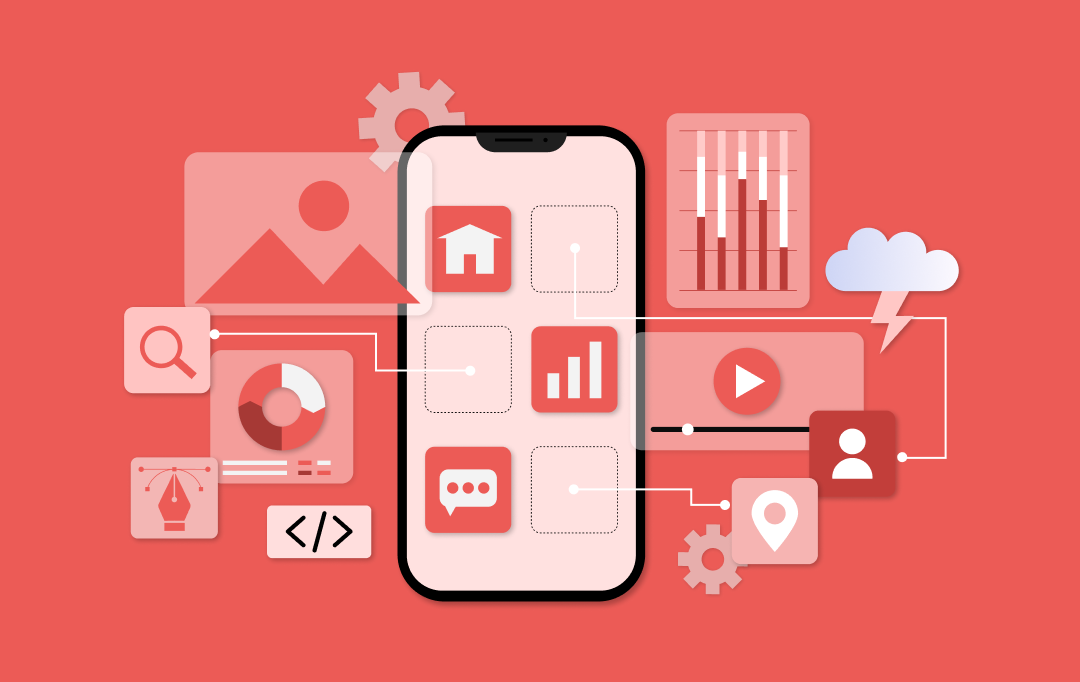- Why should organizations invest in mobile apps for digital transformation?
- Role of mobile apps in digital transformation
- 1. By Utilizing AI in Mobile Apps
- 3. Making informed decisions via real-time analytics
- 4. Increasing portability
- 5. Acting as the digital face
- How to get started with mobile apps for digital transformation?
- How Appinventiv helped top brands in their digital transformation journey?
- FAQs
 Although the above graph should be a reason enough to take mobile app development seriously, there are some other numbers as well.
Although the above graph should be a reason enough to take mobile app development seriously, there are some other numbers as well. - According to Business of Apps, 57% of the digital media usage and traffic use comes in through apps.
- On an average, any smartphone user has over 80 apps out of which they use 40 apps every month.
- 21% of millennials visit a mobile application 50+ times every day.
 On that note, in the next section, let us discuss the key benefits of investing in mobile app development for digital transformation.
On that note, in the next section, let us discuss the key benefits of investing in mobile app development for digital transformation. Why should organizations invest in mobile apps for digital transformation?
Enterprise mobile applications allow employees to connect with the core process of the business even when they are not sitting at their desks. This, in turn, results in improved employee experience and increased team productivity. The role of mobile applications thus becomes very crucial for digital transformation in business. Productivity and efficiency: Giving employees access to enterprise apps is a smart move. Such transformation apps make them more productive by allowing them to complete tasks while keeping an eye on business processes from mobile devices. Employees have the flexibility to carry the app anywhere and revert back timely without sticking to the desks. Workflow optimization: With the help of mobile software systems, team leaders can analyze the team’s performance with future optimizations in mind. Organizations can also automate repetitive monotonous activities and set predefined rules through workflow optimization apps to reduce human error. Increased customer satisfaction: Mobile applications assist businesses in better customer engagement by analyzing customer journeys, sending customized messages, personalized push notifications, and more. Digital mobile apps and chatbots have revolutionized customer service by providing users with immediate replies to their questions or requests. In short, incorporating digital apps into enterprises drastically enhances the consumer experience. Transparency: With the help of mobile apps, users can access and share content on the go at any time, from anywhere. As a result, employees get real-time updates that help them to make relevant decisions. Digital apps can also track the tasks completed by team members or even show their real-time location. When you partner with a digital business transformation consulting firm that holds expertise in enterprise application development services, they work around all these above-mentioned areas in addition to shaping the digital transformation roadmap around technology, process, and people. Learn more about the reasons to invest in enterprise mobility solutions. The multitude of reasons, cumulatively, makes mobility a prime solution offering of the US digital transformation solutions market. In the next section, let us discuss how mobile apps are playing an active role in an enterprise’s 360-degree digital transformation.
In the next section, let us discuss how mobile apps are playing an active role in an enterprise’s 360-degree digital transformation. Role of mobile apps in digital transformation
Earlier, businesses considered mobile applications as an independent entity instead of a key catalyst in digital business transformation. However, that wasn’t true, as a mobile app can accelerate the digital transformation pace and contribute towards an organization’s overall success. Keeping that in mind, here we would discuss some ways through which mobile apps can drive your business’ digital transformation initiatives. So let’s dive in!
Keeping that in mind, here we would discuss some ways through which mobile apps can drive your business’ digital transformation initiatives. So let’s dive in!1. By Utilizing AI in Mobile Apps
The benefits of using AI for bettering customer experience is are uncontested. For marketing transformation, businesses have started using AI for developing intuitive mobile apps using technologies like natural language processing, natural language generation, speech recognition technology, chatbots, and biometrics. Employees can enjoy additional intelligence and capabilities as a result of AI-powered enterprise mobility applications, which will excite them, make them wiser, and increase their productivity. AI doesn’t just help with automation of processes and with predictive, preventative, predictive analysis but also with serving customers in a way they want to be served.2. Using IoT in mobile apps
The time when IoT was used for displaying products and sharing information is sliding by. The use cases of mobile apps in the IoT domain are constantly expanding. Enterprises are using IoT transformation apps to operate smart equipment in their offices and the supply chains efficient, transparent. While still a relatively new entrant in the enterprise sector, IoT digital apps are finding ways to strengthen their position in the business world.3. Making informed decisions via real-time analytics
In the current business world, access to real-time data analytics can give you a strong competitive advantage. Mobile apps in enterprise digital transformation are a great way for businesses to collect users’ data and engage with them through marketing transformation messages designed around the analytics based on their app journey. You can use real-time analytics to know how your teams are performing, analyze their productivity, and get a first-hand view into the problems they are facing in performing a task and how it’s impacting the overall business value.4. Increasing portability
Portability in an enterprise ecosystem enables employees to work at their convenience. While it shows less impact in the short term, in the long run, it plays a huge role in how productive a team is. By giving employees the space to work as per the time and location of their choice, you give them the space to boost their creativity and productivity. One of the results of using software that enabled our employees to work according to their terms and conveniences for us was greater business expansion ideas and an increase in the overall productivity of the workforce.5. Acting as the digital face
Mobile apps not only transform business but also help unlock numerous new opportunities. Mobile app digital strategy helps businesses to stay in sync with their existing and potential customers. Thus, they have become a digital face for your organization that gives the first and foremost experience to your potential users. As customers are becoming more dependent on their mobile devices, integrating mobile applications into your business strategy will help enhance customer engagement and attain a competitive edge to outclass your competitors.
How to get started with mobile apps for digital transformation?
If at this stage, you are convinced that a mobile application is a key part of digital transformation framework, here are some tips that can help your strategies for increasing the ROI on your enterprise app – Adopt mobile-first approach – The key factor that separates enterprise apps that are winning is how organizations don’t treat apps as the extension of their websites. Their software development process is strictly mobile-only. This in turn shapes their entire design, mobile app development, and testing processes. Identifying the scope of mobility – The next tip that digital transformation consulting firms would give you is analyzing the operations and workflows for understanding which teams, departments, or functions would benefit from mobility the most. You should not start reinventing a process that works okay, instead, you should look for areas that can be streamlined, automated, or valued through mobility. Outsourcing digital transformation efforts – When we were preparing an entrepreneur’s guide on outsourcing digital transformation, we looked into several benefits of outsourcing digitalization to a digital transformation strategy consulting agency. But the prime benefit revolved around saving businesses’ efforts and time which goes into solving challenges like – absence of digital skillset, limitations of the agile transformation process, or the inability to let go of the legacy systems.How Appinventiv helped top brands in their digital transformation journey?
As a leading software and mobile app development company, we have developed many scalable mobile apps based on our clients’ requirements. We have a highly skilled team of app developers who have mastered all the latest technologies such as AI, ML, IoT, and Cloud needed to develop top-notch mobile apps that drive your digital transformation strategy. We helped Dominos improve their conversion rate by 23% by redesigning their app’s UX. This demonstrated how important it is for the customers to have a design that allows quick movements. The users are now spending more time within the app to place their orders and also track them in real-time. For another client Adidas, our experts worked on creating an end-to-end application for their Middle Eastern users. We used industry-loved technologies and frameworks across native Android and iOS to build an engaging shopping experience for their customers. To make the experience immersive, we implemented a strategic cache management system for faster application performance. We also added animations and video components on the main landing page. The results? The app has been downloaded 2 million times to date. Also, the company has acquired 500k new users. Well, these are just a few examples of the brands that we helped with mobile app development for their digital transformation process. Check out our complete portfolio here. Or, contact our experts to know how we can help you in enterprise app development for your particular business use case. We will be delighted to help you!
For another client Adidas, our experts worked on creating an end-to-end application for their Middle Eastern users. We used industry-loved technologies and frameworks across native Android and iOS to build an engaging shopping experience for their customers. To make the experience immersive, we implemented a strategic cache management system for faster application performance. We also added animations and video components on the main landing page. The results? The app has been downloaded 2 million times to date. Also, the company has acquired 500k new users. Well, these are just a few examples of the brands that we helped with mobile app development for their digital transformation process. Check out our complete portfolio here. Or, contact our experts to know how we can help you in enterprise app development for your particular business use case. We will be delighted to help you!FAQs
Q. What is digital transformation in enterprises?
A. Digital transformation is the integration of digital technologies into all areas of a business. It fundamentally changes how you operate and deliver value to your customers.Q. How can mobile apps advance our enterprise digital transformation efforts?
A. Mobile apps can bring efficiency and enable you to make informed decisions in real-time by offering seamless access to the data on the move. Also, you can target a huge audience and expand the reach of your business.Q. What is the role of applications in digital transformation?
A. The major roles of applications in digital transformation include:- Increase productivity and efficiency
- Promote transparency among employees
- Help in workflow optimization
- Enhance customer satisfaction
Q. How do you transform an organization into a digital one?
A. Our experts create a digital transformation roadmap designed to give business leaders a starting point. It acts as a checklist of what needs to be done and a sequence of steps that have to be taken. We stay with our clients from starting till the end to ensure that their digital transformation journey is a successful one.

- In just 2 mins you will get a response
- Your idea is 100% protected by our Non Disclosure Agreement.

Why Enterprise Application Security is Mission Critical and How to Get it Right
Key takeaways: Enterprise applications are increasingly complex, spanning cloud-native architectures, APIs, and third-party integrations, which broadens the attack surface. Adopting DevSecOps and embedding security early in the development lifecycle reduces breach impacts by up to 30%, proving proactive security integration is vital. Regulatory compliance, business continuity, and customer trust hinge on effective application security strategies…

How Custom Enterprise Apps Are Powering Dubai’s 2040 Vision for Smart, Sustainable Growth
Key takeaways: Custom enterprise app development in Dubai is crucial for realizing the Dubai 2040 Vision smart city goals. Custom enterprise apps are fundamental to realizing Dubai's vision for a smart, sustainable future, integrating technology into every urban facet. Smart city apps in Dubai leverage IoT, AI, and cloud technologies to create integrated platforms managing…

Enterprise Application Integration – How It Works and Why It Matters to Your Business
In the fast-paced corporate world, CEOs and CTOs are often tasked with managing multiple systems and departments, each playing a crucial role in the success of the company. But what happens when these systems don’t communicate effectively with one another? Imagine your sales team's inability to instantly share data with your inventory management or customer…















